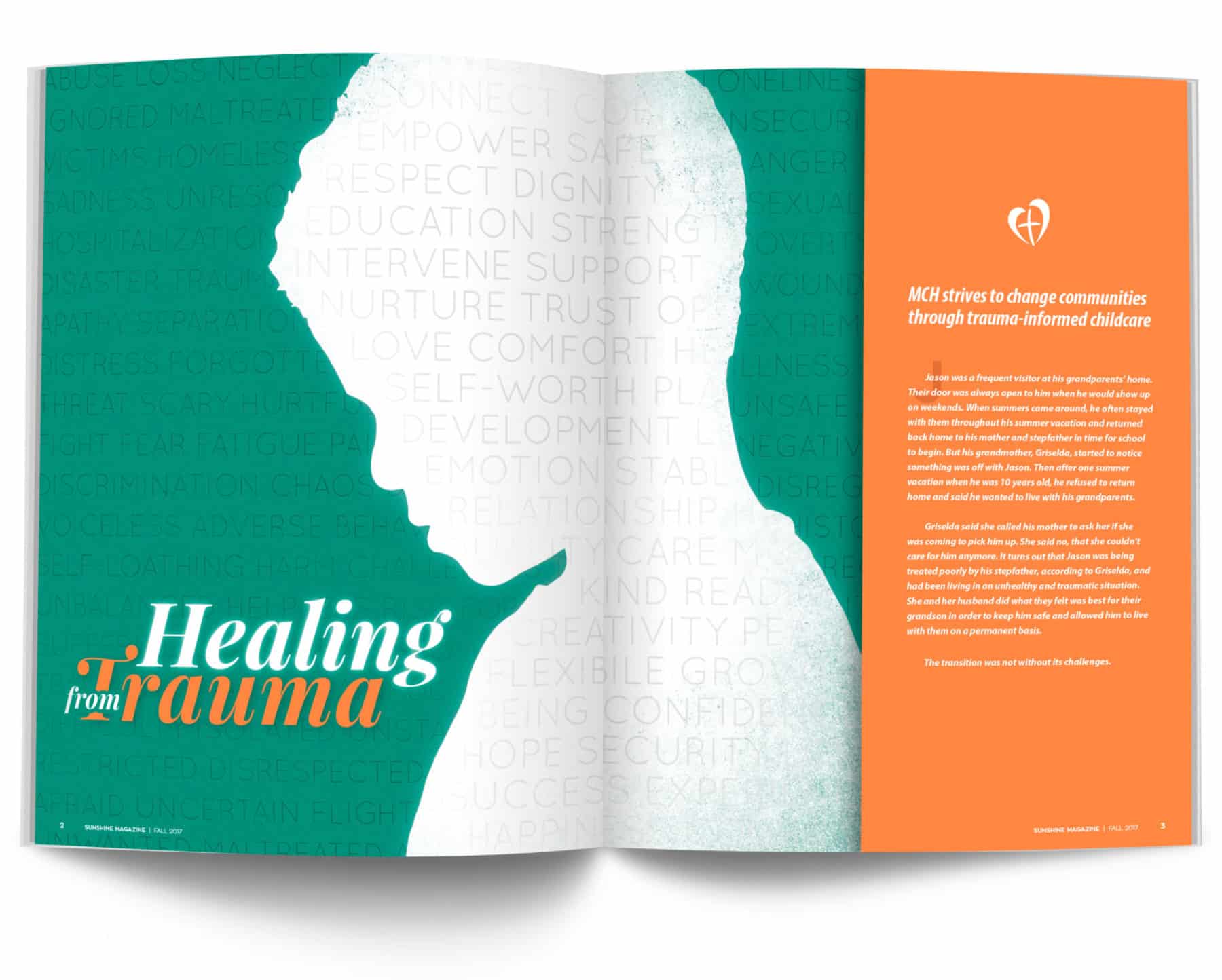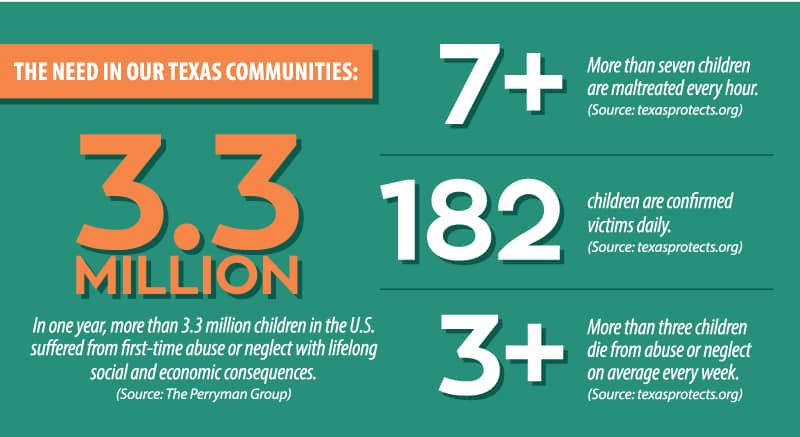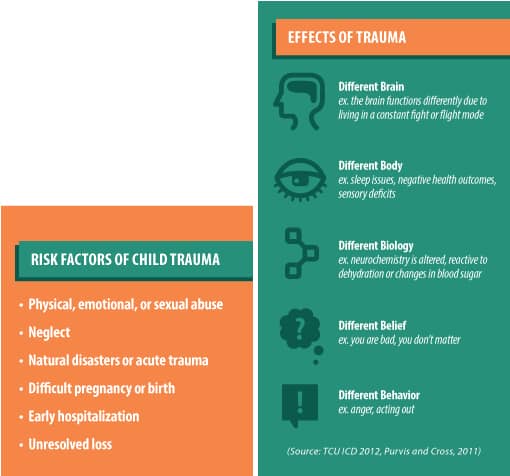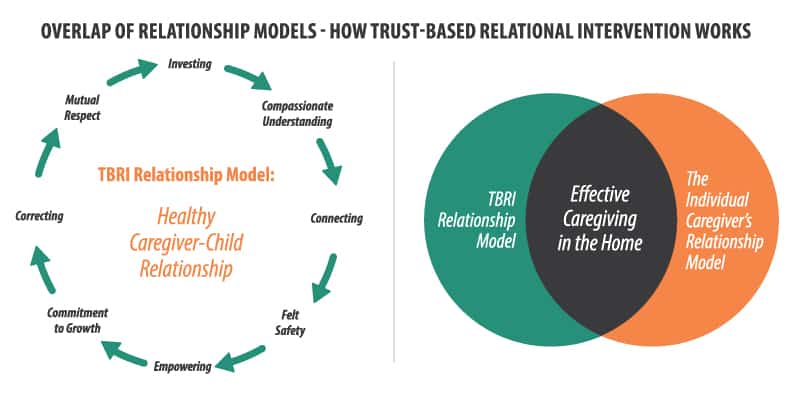
MCH Strives to Change Communities Through Trauma-informed Childcare
Jason was a frequent visitor at his grandparents’ home. Their door was always open to him when he would show up on weekends. When summers came around, he often stayed with them throughout his summer vacation and returned back home to his mother and stepfather in time for school to begin. But his grandmother, Griselda, started to notice something was off with Jason. Then after one summer vacation when he was 10 years old, he refused to return home and said he wanted to live with his grandparents.
Griselda said she called his mother to ask her if she was coming to pick him up. She said no, that she couldn’t care for him anymore. It turns out that Jason was being treated poorly by his stepfather, according to Griselda, and had been living in an unhealthy and traumatic situation. She and her husband did what they felt was best for their grandson in order to keep him safe and allowed him to live with them on a permanent basis.
The transition was not without its challenges.
“It was very difficult because all of my kids were grown up already,” Griselda said. “Also Jason was a challenge. He would yell all the time and you couldn’t talk to him. It was very difficult, but things have gotten better.”
Griselda reached out to MCH Family Outreach in Waco for help in dealing with their new normal and Jason’s needs. They were matched with case manager Sara Beth Stoltzfus who helped the family establish goals to improve their situation, such as improving communication, helping Jason address his school issues and getting him enrolled in equine therapy in order to help him build self-confidence. Stoltzfus al so provided parent education for the family.
During her work with the family, Stoltzfus led “nurture groups,” which are group activities intended to strengthen bonds between caregivers and children.
“Nurture groups allowed the family to talk openly about their feelings together as well as to have fun together and laugh during a difficult period,” Stoltzfus explained.
During groups, family members learn about giving and receiving care. Nurture groups also help them break down walls and be open to physical touch, something Jason has struggled with. Stoltzfus also showed Jason some techniques he could use to help him better control his emotions, or self-regulate, when he became anxious or upset. The family began to make progress.
“They have worked very hard to accomplish their goals and she has never given up on Jason,” Stoltzfus said. “He continuously strives for a better relationship. She lets Jason know that she loves him even when his behavior is bad. She always has had a deep love for her grandson, she just needed a little support and the knowledge of her own power as a caregiver.”
Griselda said she feels like their relationship has improved greatly since working with MCH Family Outreach, and she is more confident in her abilities to care for Jason, who is now 13.
“Before he wouldn’t let anyone hug him or give him any physical attention,” she said. “But now when he goes to school he hugs me and tells me he loves me. I feel he has changed a lot.”

A Common Issue
This family’s story is one that is heard more frequently today. Jason, although now in a loving and secure home, still deals with the effects of trauma.
“Trauma in kids can look a lot like intentional bad behavior and can be very hard for families to manage,” Stoltzfus explained. “It is important for families to know that there is hope and there are practical tools that caregivers can use to support their children.”
Methodist Children’s Home is participating in the fight against an epidemic of trauma in childhood. A study performed by Kaiser Permanente and Centers for Disease Control and Prevention in the mid-1990s found that after surveying more than 17,000 participants, Adverse Childhood Experiences (ACEs) were extremely common in all families, including middle-class, college-educated homes. It also uncovered a link between childhood trauma and chronic diseases people develop as adults such as heart disease, lung cancer and depression. The more types of trauma experienced increased the risk of health, social and emotional problems.
But there is hope.
MCH has demonstrated a commitment to trauma-informed care, meaning it has incorporated programs and childcare practices and strategies that recognize the physical, emotional and psychological effects that children from traumatic situations face and empowers them through increasing “felt safety” or a sense of control. At the forefront of these techniques is helping children learn how to build nurturing relationships and form attachments, a lesson they were unable to learn due to a breakdown in trust or through living in a state of chaos or instability.
Tim Brown, president and CEO of MCH, said the state of Texas is now emphasizing trauma-informed care which is driving the childcare field.
“There is a sense of urgency,” Brown said. “If we call ourselves helpers, we have got to emphasize it. We know trauma impacts relationships, education, physiological development, neurological development – it impacts everything that we do.”

The Effort to Educate
MCH offers parent education as part of its early intervention and prevention programs through MCH Family Outreach. The adoption of evidence-based approaches has increased in recent years due to a rising need during case management. MCH initiated Nurturing Parenting in 2012 which was followed by Circle of Security in 2016.
MCH also entered into a research partnership with Texas Christian University’s Karyn Purvis Institute for Child Development in 2010 by incorporating Trust-Based Relational Intervention (TBRI) into its everyday childcare practices. TBRI is defined as “an attachment-based, trauma-informed intervention that is designed to meet the complex needs of vulnerable children. TBRI uses Empowering Principles to address physical needs, Connecting Principles for attachment needs, and Correcting Principles to disarm fear-based behaviors.”
Born from requests for additional information, staff in MCH Family Outreach in Waco recently developed a new curriculum, called Connected Caregiver, which incorporates all three trauma-informed, evidence-based approaches for families and groups. The approach has been embraced by community partners such as Jesus Said Love, a ministry in Waco, and Hope House in Albuquerque, N.M.
“We put together what we thought was the most cohesive information incorporating some Nurturing Parenting, some Circle of Security and really focusing on TBRI and found that it is a great thing to take any parent through,” said Brooke Davilla, director of MCH Family Outreach in Waco.
They also adapted the information to be helpful for educators, called Connected Classroom. Teachers and administrators learn to understand some of the behaviors they witness in the classroom and are given tools to improve the learning environment and help students concentrate. It has been well-received by school districts such as Midway ISD (Waco), Tyler ISD and Bryan ISD.
Davilla said their partnership with Midway ISD began with parenting classes for pregnant teens and has since grown into the Connected Classroom presentations. She said it is encouraging to see how the teachers and administrators are embracing the knowledge and better understanding some of the behavioral trends they see in classrooms.
“We find that a lot of teachers and support staff are figuring out inventive ways to connect with their students to get their needs met, but I think they were doing it quietly thinking that it was maybe not OK or not supported,” Davilla said. “Seeing that their administration is open to conversation, I saw a lot of hopefulness in that.”
One teacher from Midway ISD who attended the classes said, “It was very beneficial to learn the factors that contribute to students’ behavior choices. Learning how to better meet the needs of the students in my classroom will enable my students to feel safe and secure, which will then create a better learning environment. I really thought the workshop was great! Everyone was so knowledgeable and welcoming!”
Kelly Smith, program administrator for the Western region of MCH Family Outreach, said the new educational curriculum is a valuable asset to staff in helping families and educating their communities.
“Connected Caregiver and Connected Classroom provide the opportunity to bring the best of three top-notch parent education pieces to families simultaneously,” Smith said. “MCH staff are using these to empower caregivers and educators to use evidence-informed practices with children across a variety of settings. It’s one more way our competent and committed team members impact the lives of children and families.”
MCH Family Outreach encourages staff to become trained facilitators in parent education programs and currently has 27 trainers for TBRI, 28 in Circle of Security, and 50 in Nurturing Parenting. All new childcare staff at MCH must also undergo TBRI training during orientation.
“We are interested in bringing this curriculum and information to caregivers who need an extra bit of support in their roles,” Smith said. “Sometimes the support, too, comes in the form of spending time with others who are going through the same things. We hope these classes bring both and strengthen families in the process.”

Paying it forward
MCH strives to impact communities, and hopefully society, through sharing its knowledge and helping individuals understand the value of connection. Its goal is to bring Connected Caregiver to more families through church venues and other like-minded agencies as well as to help educators find more tools to use in the learning environment. Brown hopes that by sharing a common language and mission, more children who have experienced trauma will be able to heal and become successful adults.
“We have to reach out and engage our community in a way to strengthen that connection, strengthen our moral and spiritual meanings,” Brown said. “Our church is our community, our work, our school system. If we do it well and we do it right, things get better and kids don’t have trauma in their life. Or if they do, they have the tools to get better and deal with those issues and stay healthy.”
For more information about offering Connected Caregiver or Connected Classroom at your organization, please contact us at 254-750-1260 or visit MCH.org to find an outreach office near you.
Leave a Reply